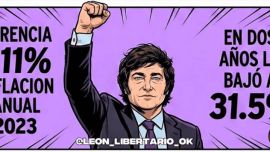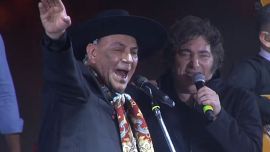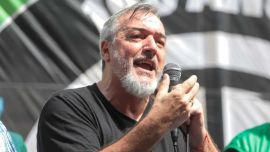BUS-DRIVERS BASH BERNI
The week was off to an explosive start when the murder of La Matanza bus-driver Daniel Barrientos (65 and a month away from retirement) by criminals in the small hours of Monday led to Buenos Aires Province Security Minister Sergio Berni being “ambushed” later that day by the dead man’s infuriated colleagues when he attempted to mediate in their protests, arriving by helicopter. The City Police riot squad came to Berni’s rescue with injuries on both sides of the clash. The next day both Berni and Buenos Aires Province Governor Axel Kicillof hinted strongly at the opposition being behind the bus-driver’s death for electoral gain with the latter pointing his finger at PRO chair Patricia Bullrich. There were two arrests during the week for the Barrientos murder.
DÓLAR AGRO = MORE AGRO?
Economy Minister Sergio Massa on Wednesday announced a “dólar agro” of 300 pesos for farm exports (on a broader front than the previous two versions of the “soy dollar” since it extends to regional economies as well as grain) as the central plank within a programme to boost exports. The scheme will run from today until the end of May for soy and until the end of August for regional economies with Agriculture Secretary Juan José Bahillo expressing optimism that the incentive could net US$9 billion, an optimism not shared by many farmers and economists, who forecast half of that. The scheme also makes the benefits of emergency legislation automatic for all drought-stricken farmers in those zones without need for application while penalising those who do not cash in their export dollars by stripping them of their CUIT tax identification numbers. Massa described the drought as “the worst in Argentine history,” causing “irreparable” damage to almost 70,000 farmers.
FOREIGN COURT RULINGS
Argentina lost on Wednesday a lawsuit presented by four hedge funds to the London High Court accusing the country of shortchanging growth- linked bonds, sentencing the payment of 1.33 billion euros when their original claim in 2019 had been for 643 million since judge Simon Picken added interest. The hedge funds charged that the Cristina Fernández de Kirchner administration had manipulated growth rates downwards, especially in 2013, in order to avoid honouring an extra bond payment only valid when annual growth exceeded three percent. The Argentine government is expected to appeal the decision. The legal setback comes just five days after a Manhattan court ruled against YPF in a lawsuit for alleged 2012 nationalisation irregularities mounted by Burford Capital hedge fund, a decision which could end up costing Argentina up to US$17 billion.
RENT LAW UP IN AIR
The government is studying the suspension of its rent law in force since mid-2020, at least on a temporary basis, because it is believed to contribute towards a dysfunctional housing market by shrinking the number of properties placed on offer and thus jacking up rents in times when inflation is a major problem. This possibility was broached by President Alberto Fernández and Economy Minister Sergio Massa as a priority issue at a Tuesday meeting. One of the most criticised clauses in the law is the three-year duration of contracts with annual updating when the previous legislation stipulated two-year contracts which could be renegotiated at any time.
PICKETS AGAINST AUSTERITY
There were 128 picket blockades nationwide in midweek to protest cuts in social plans, blaming the austerity on Economy Minister Sergio Massa taking heed of the International Monetary Fund (IMF). Trotskyist picket leader Eduardo Belliboni announced that between April 18 and 20 the protests would extend to camping outside the Social Development Ministry headed by Victoria Tolosa Paz.
BORGES MYSTERY CONTINUES
María Kodama, the widow and universal heir of the great writer Jorge Luis Borges, left no will and testament upon her death from cancer at the age of 86 last month, it was revealed last Monday by her lawyer Fernando Soto, thus leaving his inheritance vacant. The entire literary estate and copyright of the author could thus pass into state hands although five children of her late brother Jorge Kodama surfaced last week and universities in Japan and the United States are also in the running.
ALBERTO IN CHILE (AND UNASUR)
President Alberto Fernández made a flying visit across the Andes last Wednesday to commemorate together with his Chilean colleague Gabriel Boric the 205th anniversary of the victory of Maipú over the Spanish by the independence heroes of their two countries, Generals Bernardo O´Higgins and José de San Martín, and their historic embrace after clinching Chilean independence. Fernández was not the only visiting president honouring the anniversary – also participating were Luiz Inácio Lula da Silva (Brazil), Luis Arce (Bolivia), Gustavo Petro (Colombia), Miguel Díaz-Canel (Cuba) and Xiomara Castro (Honduras), as well as a couple of Caribbean heads of state while other Latin American leaders joined a virtual session discussing common action against inflation. Fernández also met up with Boric to discuss the bilateral relationship against a backdrop of recent tensión following the Argentine president’s criticisms of Chilean court cases against progressive politicians as more “lawfare.” Before his return here, President Fernández confirmed Argentina’s formal return to the Unasur South American grouping which he had already announced at last month’s Grupo de Puebla regional summit.
ANTI-KREMLIN VOTE
The United Nations Human Rights Council on Wednesday condemned the Russian invasion of Ukraine with 28 votes in favour (including Argentina) and two against (China and Eritrea) with even Cuba joining the 17 mostly Afro-Asian countries abstaining (also Bolivia and Honduras). During the debate Argentina blasted “Russian aggression” and “a wide range of violations of international law and human rights.”
SOUTH ATLANTIC WAR RECALLED
The 41st anniversary of the outbreak of the 1982 South Atlantic war was marked last Sunday with the public holiday falling during a weekend this year. The main ceremony of war veterans was held in the Tierra del Fuego city of Río Grande, attended by Defence Minister Jorge Taiana. The anniversary was also the occasion for the conflict to be renewed, not on a battlefield but over a football pitch and via social networks. Malvinas Secretary Guillermo Carmona chose to highlight the 2-0 win of runaway Scottish Premiership leaders Glasgow Celtic over humble Ross County struggling against relegation because the second goal by Argentine substitute Alexandro Bernabei led to Argentina being celebrated on British soil on April 2. Former British Ambassador Mark Kent, now CEO of the Scotch Whisky Association, deplored the way Carmona had mixed politics with sport , calling him "a poor and shameless populist politician." Carmona retorted by accusing Kent of "using humanitarian questions to justify colonialism." Towards the end of the week there was also tension with Britain over the identification of six of the 1982 war dead on the islands with Carmona again accusing Britain of using humanitarian issues to block progress.
POLICE SPY SENTENCED
At the end of last month federal judge Daniel Rafecas gave Américo Balbuena, the former Federal Police officer who posed as a journalist for over a decade in order to spy on social organisations, a suspended two-year prison sentence. The same sentence extended to two senior Federal Police officers authorising Balbuena’s activities. All three men were found guilty of malfeasance. Myriam Bregman, a FIT leftist deputy and frontrunner for that party’s presidential nomination, was among the lawyers for the prosecution. The defence lawyers denied that any crime was involved while not disputing Balbuena’s activities between 2002 and 2013, now belatedly coming to trial. The trial lasted four days.

















Comments